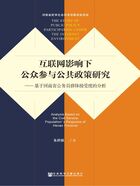
ABSTRACT
The birth and development of the Internet has brought fundamental changes to human lifestyle and production,but at the same time,instituted new factors in considering issues of public management.As the influence of the Internet persistently increases,scholars have developed in-depth investigations and analysis into its effect upon Chinese public policy making process.
In order to construct a more extensive investigation into the Internet’s influence on Chinese public policy,the thesis utilises open interviews as its basic research method to engage in deep discussions with government officials at all levels in gathering first-hand information,aiming to clarify the extent of the influence the Internet has exerted upon government policy decision process.
This thesis constructs a discussion framework according to the designs and process of public policy development,with considerations to the theory of origin analysis as its basic investigative method,the paper aims enquire into the influence the Internet has upon the different stages within the development,implementation and evaluation of public policy in China.This is followed by investigative interviews with present governmental officials in seeking for the degree of effect the Internet has within public participation of governmental policy changes.
Through three practical local examples,including investigations into public policies regarding Zhengzhou Aviation Composite Experimental Zone,Henan Province’s tomb removal initiatives and Zhengzhou city’s treatment of smog conditions,the thesis attempts to uncover the real effect of the Internet upon the degree of public participation within public policies.
During the process of developing public policies,although the popularization of the Internet has some influence upon the decision-making procedure,but governmental systems still operates according to its traditional bureaucratic approaches.Although governmental officials have a certain degree of familiarity to the Internet’s influence,without pressure from superior levels,they would be reluctant to treat it as a necessary factor in deliberating issues regarding public policies.
Within formulating governmental policies,the Internet has an imperceptible,but much more significant effect upon governmental organisations.Under the influence of the Internet,government workers multiply expressions of benefits,and also the opportunity to learn through the Internet in order to elevate their ability in designing the said policies.Unfortunately,the current policy making system has not received any fundamental change,resulting in merely functionary changes in which the aspects of the modern technology being fitted into the current bureaucratic system.In comparison,within the county level,governmental organizations are more effective in their incorporation of the Internet as a medium for publicizing governmental policies in order to gain a greater reception within the public.
In carrying out governmental policies the influence of the Internet upon supervision of both basic policies and specific policies are unprecedented.However,in attempt to evade responsibilities,government functionaries would often wittingly prevent the publication of the progress and result from particular governmental actions.
Within the evaluation stage,the Internet was able to break apart the original system in allowing for the possibility for multi-subject evaluation,which is greatly beneficial to the supervision and facilitation in the later stages of implementation.
The thesis,at its conclusion,was able to reach a conclusion similar to John Clayton Thomas’ finding of a framework that incorporates greater participation of the public within the existing governmental framework in its decision process.The innovation of this paper focuses upon the crucial factor that is involved with redesigning governmental policies – the people who design the policies,hence the governmental officials themselves.The paper investigates the issue with,firstly,fresh perspective in evaluating the effect of the Internet on decision making,most importantly through the compilation of first-hand material from interviews with official over the two years;and secondly,reference to Thomas’ established model,through detailed analysis of examples of current Chinese government policies and previous gathered data,have been able to determine five independent public policy-making models under the influence of the Internet in China,namely independent management,self-management,improved decision decentralized citizen consultation mode,integral Civic Association business model,all of which could be employed for differing situations at different periods of development.
Keywords:the Internet;Public Participation;Public Policy;Policy Process;Internet Opinion